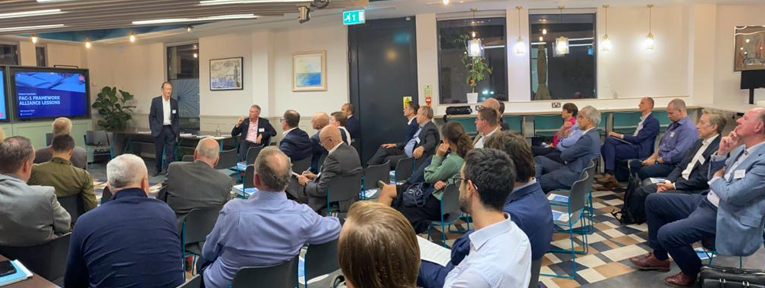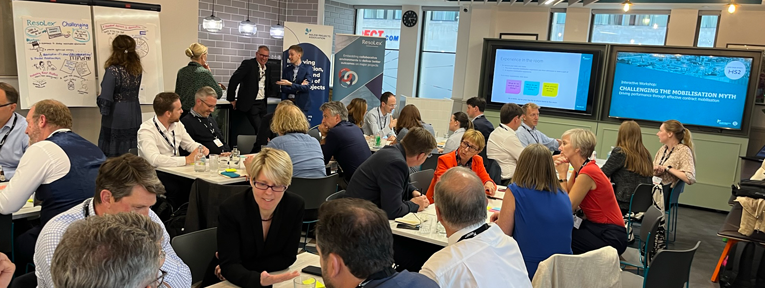
Jul 26, 2024 | Events
Last month, ResoLex was invited to join the International Centre for Complex Project Management (ICCPM) roundtable series, in London. The ICCPM is a not-for-profit organisation, established in 2007 by the Australian government to gather knowledge and best practice from around the world to help improve the performance of complex projects. The global roundtable series is a thought leadership activity, harnessing the collective wisdom of complex project leaders from around the world to produce new insights and practical steps that organisations can take to improve project outcomes. The sessions also provide an opportunity to exchange knowledge and experience, and discover new insights from others across sectors, industries and countries.
The keynote was given by Murray Rowden, Global Head of Infrastructure at Turner & Townsend. As someone with over 30 years of experience in infrastructure delivery around the world, Murray shared his reflections on whether today’s approaches are fit for today’s challenges. His reflections called attention to the artificial nature of the boundaries between disciplines, teams, and organisations, and the impact that these boundaries can have on the delivery of complex projects and programmes. From his perspective, asset owners and operators have recognised that relationships are not where they need to be, and there is a move towards increasingly value-based, long-term relationships with the industry to be able to effectively manage and deliver complex projects.
During the day, we had the opportunity to explore the perspective of complex projects as open systems, interacting with both the internal and external environments, against the more traditional view of projects as closed systems with predefined boundaries. This description provides a shift in focus towards identifying the roles of varied stakeholders and their context or environment in shaping the project’s outcomes.
A number of central themes were explored during the day, with a rich conversation from a broad group of project professionals, clients and the supply chain. Discussion focused on four core areas:
- What is the correct level of collaboration and co-design between the different related functions in a complex project?
- What is the role of project leaders in orchestrating the integration of this intricate web of related, but traditionally distinct disciplines within complex projects?
- How can we/should we best reconfigure project boundaries to align with the full life cycle of assets
- By re-imagining boundaries, can organisations enhance project success rates, optimise resource allocation, and ensure long-term value creation?
Throughout the event, it became increasingly evident that there is a critical requirement to engage stakeholders early from across the project life cycle to define project boundaries and negotiate expectations and desired outcomes. The importance of the client in leading this stakeholder management was highlighted by many, and across the discussions, there was also a strong acknowledgement that the complexity inherent within open systems requires a less hubristic client model. The idea that clients can instead adopt a more collaborative approach with the supply chain, in which we co-design shared outcomes and set up a collaborative culture and behaviours, may allow the client to better support the broad stakeholder requirements and lead to better project outcomes.
The workshop outcomes will be integrated into the wider insights collected from the full roundtable series and will contribute to a better understanding of how we can manage open project boundaries and the relationship with key stakeholders. We look forward to seeing the final outputs of the research and continuing to contribute to the thought leadership in this important area of research.
Led and facilitated by: Collin Smith (ICCPM CEO), and Dr Naomi Mather, (ICCPM Director for Industry Liaison & Member Services)

Feb 27, 2024 | Events
On the 12th of February, two of our Senior Consultants, Tom Chick and Joanna Jarvie attended the ICE’s Big Debate: ‘How do we improve certainty in delivery?’
The topic itself is a question many of us are grappling with, not just in infrastructure, but across a variety of complex projects and programmes in many industries. The debate was a highly informative and engaging event, with views put forward by Mark Hansford, Nick Smallwood, Dervilla Mitchell, Ed McCann, Dr David Prout, David Coles and Mark Thurston.
There was a lot of good debate throughout the evening, with a few key themes that seemed to run throughout much of the discussion:
- Shifting to an outcome-focus
- Planning for success
- Developing people capable of delivering
- Embedding the right environment for the scheme
Tom and Jo have shared their takeaways from the evening structured around these key themes:
Shifting our viewpoint to be more outcome-focused and measuring success based on achievement of the desired outcomes
The usual approach to project delivery fixates on time and cost as measures of success. This occurs even though the purpose for the existence of any project or programme is ultimately to achieve the desired outcomes. Delivering on time and on budget, without delivering the outcomes, is clearly a wasted endeavour, and yet, the success of delivery teams is all too often measured solely on these metrics. There is no point to delivering a project on time and under budget if it does not achieve anything that it set out to do.
Crossrail was raised as an example of a project where delivering against the outcomes has been used to demonstrate success that may outweigh the time and cost overruns. The Elizabeth Line is already the most-used rail line in Great Britain1 and the most highly rated TfL service for customer satisfaction.
One of the things that was raised as an enabler to becoming more outcome-focused, is clearly communicating the importance of these outcomes. Many schemes, like Crossrail, are focused upon providing a public benefit. Being able to clearly articulate these desired outcomes can therefore provide long-term resilience to the scheme through wider approval and support.
Planning for success
The importance of focusing time on planning before diving in to delivery was discussed throughout the evening. Major projects and programmes require detailed planning, team set-up and defined ways of working to ensure that the desired outcomes are understood and achievable. Key to this is connecting with political decision-makers who often put a lot of pressure to ‘get boots on the ground’. It was suggested that communicating with these individuals often does not come naturally to project professionals, however, if we are to reduce uncertainty, educating them on the importance of a considered, planned approach is paramount.
Developing people capable of delivering
The importance of having the ‘right people’ to deliver your project was raised in several ways, with leadership in particular sparking a lot of debate. Relying upon these perceived ‘heroes’ isn’t just unlikely to achieve the desired outcomes, but potentially prevents them from being achieved at all. Rather, the focus should be on upskilling people to build and lead teams that can work together to their own diverse strengths, create alignment, manage the complexity, and deliver integrated major projects and programmes.
This team likewise needs to be bought into the project outcomes and understand why they are doing what they are doing. The 2012 Olympics were used as a great example, in that the vision, messaging and desired outcomes were clear and communicated from the start, with everyone bought in. All of the participants knew what their role was and what they were aiming for. For example, in this particular case, being ready for 2012 was a core desired outcome and critical to the success of the project.
Embedding the right environment for the scheme
The bigger and more complex a project is, the more important it is to manage the interfaces, however, it is also more difficult as these interfaces increase in number and complexity.
On a relatively small and simple project, traditional transactional relationships may suffice, however, the complexities of bigger programmes necessitate cooperative or collaborative relationships to manage the increasing number of interfaces and conflicting priorities.
The ‘right’ environment is therefore different for every project but needs to be established as part of the planning to ensure the needed behaviours and ways of working are articulated and embedded.
The debate showed that there is no one clear simple answer to increasing certainty across the diverse array of mega or giga projects being undertaken, however at the heart of the key themes from the debate lies the need for an effective, diverse team, working together towards clearly articulated and aligned outcomes that define success.
1: passenger-rail-usage-jul-sep-2022.pdf (orr.gov.uk)

Dec 1, 2023 | News and insight, Tools
In a fast changing world, large organisations are increasingly engaged in projects and initiatives that are strategically critical. Such projects are likely to involve hundreds of people from different parts of the organisation working as cross-functional groups. The success or failure of such important initiatives is likely to be heavily influenced by the extent to which leaders and managers can motivated and organise these numerous groups to come together work as a single effective ‘Big team’.
A team of teams
There is an important distinction to be made between ‘big’ and ‘small’ teams. These simple words explain a much deeper concept. Terms like small and big are part of our basic language. They can therefore be seen to be generic, having a wide range of applications. In the context of teams, however, these two words have a precise technical role which helps establish some key differences.
The small team is the unit of production within any large enterprise. Emperors and generals have historically organised their armies and administrators into manageable groups. This is not however a top-down management strategy to create neatly arranged grouping on an ‘org chart’. It is actually a reflection of how humans prefer to work with each other. Groups of people naturally fall into sub-groups as the numbers involved start to increase. This is partly because we can typically maintain close engagement on a regular basis with up to ten people, but beyond that number, communication starts to become more sporadic and building close working relationships is more difficult. The point is that large teams do not exist as a single homogenous whole, shaped by a unitary corporate culture. Instead, a ‘Big Team’ is an organic collection of small groups whose roles and activities shift and change as the project they are engaged on progresses. Organisational success therefore depends upon the extent to which the leadership can enable this assembly of small teams to work effectively together as sub units which make up a single Big Team.
When working with leaders, we frequently hear the desire to create a high-performing team, but without having a clear idea as to what high performance actually entails. What constitutes performance is often subjective, depending upon the expectations of a particular team. When working with a collection of teams that make up a ‘Big’ team, however, performance must be articulated much more clearly so that there is a common understanding by everyone involved as to what is expected.
It is possible to map out a progression of activities that will enable the development of a high-performance environment which has the following features:
- Clear objectives fixed around sponsor and customer needs, giving the team a firm understanding of the desired outcome.
- Low hierarchy allowing direct connections between leadership and other specialist teams.
- Confidence in a low blame culture balanced with an expectation of high accountability.
- Fluid peer-to-peer networks where teams are encouraged to engage directly with one another to explore solutions.
- Strong behavioural norms which support a collaborative culture
Given the right environment, we have identified six primary elements that numerous practitioners have found to have a significant impact on the success or failure of a team engaged on a major project. They work in the following progression:
1. Shared Leadership
Big teams don’t necessarily need big leaders. All teams need some form of leadership but in Big teams, the ability of a number of individuals to take on the various aspects of leadership at various stages is critical to success.
2. Establishing the right project culture
One of the critical elements of success is to build a culture of alignment, but this cannot be mandated. Instead, the leadership team must create the right conditions to allow the desired project culture to emerge and mature.
3. Build alignment
Big teams must be able to focus on the right direction of travel even if they are not yet clear on the exact route. There are a series of practical activities that should be mandated as part of the set-up phase for each team and sub-team the is to be part of a major project. These include setting a clear vision, articulating core values, building interpersonal relationships with other teams, and agreeing a set of common rules for communication
4. Accelerated learning
Fast learning habits allow the teams to explore and experiment moving forward in short bursts of activity and adjusting plans as they go. The team is, in effect, learning how to learn. In a fast-changing environment, however, they may not adjust quickly enough to the new conditions and performance or output is likely to decline.
5. Maintain engagement
Leaders cannot force their followers to be engaged. All they can do is to create the right environment and anticipate the team will find their own drive and motivation. The core engagement activity is around communication and the use of an aligning narrative that informs and influences the messages and stories the teams use to understand what is happening in the wider organisation.
6. Build team resilience
In any complex and volatile environment, individuals and teams will find themselves in prolonged periods of pressure and stress. Team resilience differs from individual resilience in that given the right preparation, team members can learn to support each other so that they work together through periods of difficulty.
Summary
Teamwork is a fascinating and multifaceted subject. The contents of this article have hopefully given you a glimpse of the concepts, processes and structures for setting up a Big Team to give it the best opportunity to succeed. The component parts of leadership, culture, team set-up and team engagement are familiar to anyone who has frequent involvement in major projects. The framework is nevertheless novel in so far as it places the human components at the centre of business planning where as common management practice allows them to drift to the periphery.
There are, however, few shortcuts in the process. Building an effective team requires an investment in time and energy, both in the planning and implementation. The reward for this investment can be significant, improving the chances of bringing the project to a successful conclusion, on time and on budget. We would encourage any leader likely to have an involvement in a complex project to make the effort to move beyond standard practice and take the necessary steps required to build an effective Big Team.

Oct 18, 2023 | Events, Roundtables
Last week, we were delighted to be joined by Professor David Mosey CBE for an update and lessons learned since the launch of the FAC-1 Framework Alliance Contract.
Ed Moore opened the session, commenting that David had first introduced the FAC- 1 Framework to the ResoLex audience at a previous roundtable event in February 2018. It was therefore heartening to see the traction the framework has achieved over the last five years.
David began his presentation by explaining that the FAC-1 is a multi-party framework alliance contract that integrates the procurement and delivery of one or more different projects, with the ability to connect multiple contracts awarded to each collaborative team member. It creates the ability to establish the relationships and systems that the parties wish to use to embed collaborative ways of working, supporting the achievement of improved value, risk management and dispute avoidance.
So far, the contract has been adopted on the procurement of over £100 billion of contracts, ranging from smaller £5 million projects and SME consultant alliances to the £60 billion contractor/ consultant/ supplier procurements of the Crown Commercial Service.
Some of the key features of the FAC-1 contract are as follows:
- Creates a bridge that integrates multiple project appointments and operates in conjunction with multiple FIDIC, JCT, NEC and PPC forms
- Allows alliance members to include the client, any additional clients, an in-house or external Alliance Manager and any combination of selected consultants/ contractors/ suppliers/ providers, with the facility to add additional alliance members
- Enables the planning and integrating of a successful alliance, setting out why the alliance is being created, and stating agreed objectives, success measures and targets, with agreed incentives if these are achieved and agreed actions if they are not achieved
- States how work will be awarded to alliance members, under a direct award procedure and/or competitive award procedure and under early standard form orders
- Describes how the alliance members will seek improved value through shared alliance activities, including a collaborative system for engaging with tier 2 and 3 supply chain members
- Describes how risks will be managed and disputes avoided, using a shared risk register, core group governance, early warning and options for an independent adviser and alternative approaches to dispute resolution
- Provides the flexibility to include particular legal requirements and special terms required for any sector and in any jurisdiction.
David highlighted a number of different examples where FAC-1 has been used successfully, and one of the best examples came from the Ministry of Justice.
New Prisons complex project alliance
The UK Ministry of Justice (MoJ) created an FAC-1 Alliance to procure their £1.2 billion new prisons programme. The alliance integrates the work of ISG, Kier, Laing O’Rourke and Wates as contractor alliance members, with Mace as alliance manager, and supports their use of BIM and Modern Methods of Construction to agree on optimum designs and strategic relationships with key tier 2 supply chain members.
MoJ report that their FAC-1 new prisons alliance has meant they have been able to use the alliancing process both as a contract form and as the means to structure the relationships. This approach helped to embed the collaborative relationship early, from the alliance launch to the transition through the different phases. Each of the four contractor alliance members nominated representatives from their organisation to sit alongside representatives from the MoJ and its other delivery partners (Mace, WT Partnership and Perfect Circle). Together, they formed the Core Group, establishing strong leadership and trust from the outset.
One of the highly positive outcomes of the use of FAC-1 has been greater cost certainty and cost savings. MoJ reported that these included:
- Fees for the pre-construction collaboration phase finalised at the tender stage
- Direct fees (overheads and profit) and staff preliminary rates fixed at the tender stage
- Projected duration and contract value based on previous prison builds at HMP Five Wells and Glen Parva
- Pre-construction supply chain collaboration to build up cost certainty and savings by transparent supply chain engagement for key or critical packages on all four prisons i.e., mechanical, electrical, and plumbing engineering, pre-cast concrete, and cell windows and doors.
Final thoughts
The final message from David was that recent evidence suggests that more public sector clients are starting to look at alliancing as a beneficial method of procuring major projects and programmes of construction work. Alliancing does however require a significant shift in both mindset and behaviours, where each of the parties involved is intent on working collaboratively over a prolonged period to achieve win-win gains. In the absence of an agreed set of processes and structured agreements, there is a tendency to revert to short-term transactional behaviours.
The advantage of FAC-1 is that it provides a set of highly flexible mechanisms which are easy to set up, and then provides the programme leadership with the processes needed to create effective relationships.
You can find the round-up from the first FAC-1 roundtable on our website here: https://resolex.com/events/resolex-roundtable-building-a-supply-chain-alliance/
For anyone thinking of using the FAC-1 contract, David has written a handbook which helps clients, contractors and advisors think through some of the practical aspects of implementing the framework. You can purchase it here: https://www.amazon.co.uk/FAC-1-Framework-Alliance-Contract-Handbook/dp/1913019837

Sep 13, 2023 | Events
On Wednesday the 13th of September, we partnered with the Major Projects Association to host an interactive workshop that challenged the myth of mobilisation – and what an event it was!
We’d like to extend a huge thank you to Liz Lawman, Head of Mobilisation at HS2 (High Speed Two) Ltd and Jonathan Wareham, Project Director at Costain Group PLC for sharing their insights from both a client and contractor perspective. During the workshop, we highlighted some industry best practice and then delved into a session designed to explore the experiences from around the room. We followed Chatham House Rules, but here are a few themes from the afternoon:
- The movement from traditional transactional relationships that prioritise the lowest tender cost, to a more collaborative relationship that can manage the complexities of major project delivery requires aligned mobilisation
- Project teams need to understand the need for, and plan to create a cross-functional workstream for the ‘social/behavioural’ elements of major projects, which includes contract mobilisation
- Ringfence time at the start of a project or programme with senior leaders to co-create with all parties, build the right environment and set the team up with the skills, processes, behaviours and ways of working to develop a collaborative environment
- Early engagement with the supply chain to co-create solutions is hugely important, and provides even more value when it is part of the procurement approach
- The team needs to be aligned behind a common purpose from the start. Work to reduce reliance on assumptions that people will work well together
We would like to thank everyone who attended and contributed to what quickly became an incredibly thought-provoking event. We hope to keep the conversation alive and support the development of a more systemised mobilisation framework alongside the MPA and some of the industry experts who joined us.
As a final lesson from the workshop, ‘don’t build the boat after leaving the port!’






